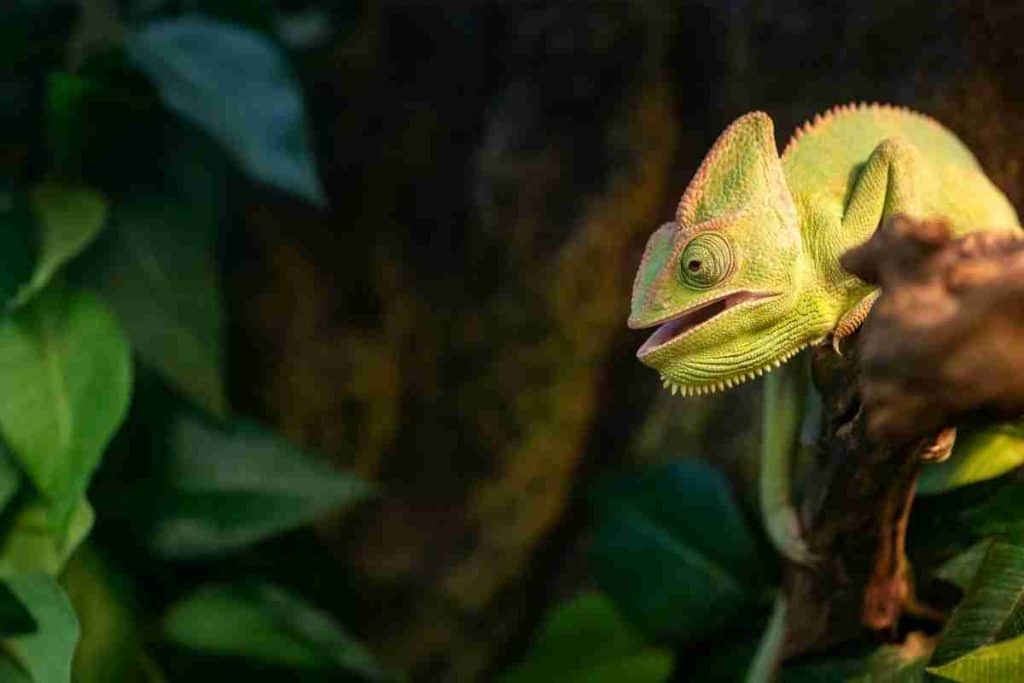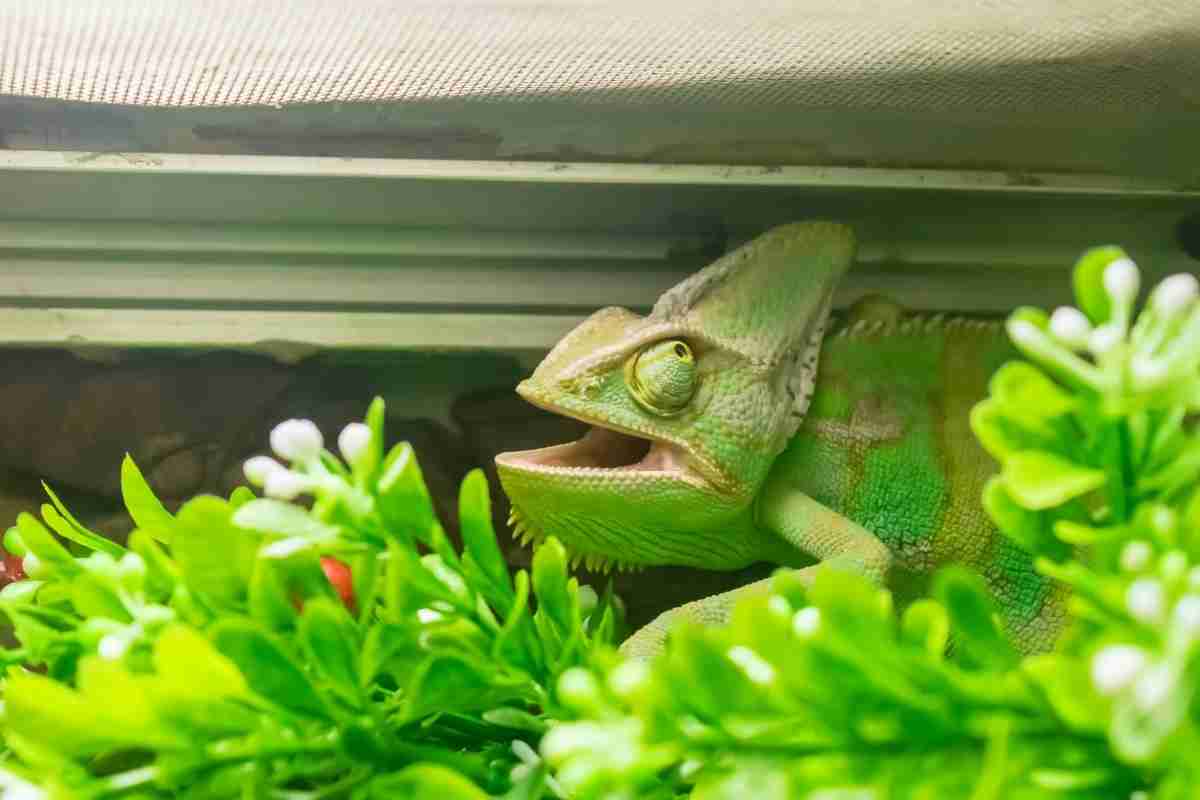Why Do Chameleons Hiss? If you’ve ever owned a chameleon, then you’re probably familiar with their hissing sound. But have you ever wondered why they do it?
Well, there are many different theories as to why chameleons hiss. To some, it might seem like a random, aggressive act, but there’s actually a reason behind it.
If you have a chameleon and he’s been hissing a lot lately, there’s a good chance something is stressing him out!
So in this article, we’ll go over eight potential reasons why your chameleon might be hissing and what you can do to help solve the problem.
Why Do Chameleons Hiss? 8 Reasons Why!
1. To Scare Away Predators Or Potential Threats
One of the most popular theories is that chameleons hiss as a way to scare away predators or potential threats. By making a loud, aggressive sound, will intimidate their attacker and hopefully make them retreat.
This makes sense, especially when you consider that chameleons are prey animals. They’re not big or strong, so they need to use every tool in their arsenal to protect themselves.
Hissing may also be used as a warning signal to other members of the group. If one chameleon sees danger approaching, it can give a warning call to the rest of the pack, who will then take evasive action.
Chameleons will do this if you try to handle them when they’re not comfortable with it, they might hiss at you as a warning. Something to keep in mind!
2. To Show Dominance Over Other Chameleons
Another reason why chameleons hiss is that they’re trying to establish dominance over another chameleon. They could be a potential threat or just an annoyance, but either way, the dominant chameleon will make them know who’s boss.
This behavior can also sometimes lead to physical confrontations between two male chameleons. This isn’t to say that chameleons will hiss at every other chameleon they see.
It can be a dominant thing, but it also depends on the species and whether or not they’re similar in size or age. Usually, male chameleons are more aggressive towards others of their kind if they have reached sexual maturity.
If you have more than one chameleon and you see this kind of behavior happening, it might be a good idea to separate them!
3. As A Warning To Signal That They’re About To Attack
A third reason why chameleons hiss is that they’re trying to warn you (or other chameleons) that they will attack. If your pet chameleon feels like it or its territory is being threatened, then it might try to intimidate the threat by making a warning sound.
Or it could be when you handle them and they’re not used to it. In this case, the chameleon is trying to tell you that it doesn’t like what you’re doing and that you need to stop.
If a chameleon does start attacking, it can be dangerous because of its sharp claws and teeth.
So always be aware of their body language and listen for any warning sounds they might make so that you can avoid getting hurt.
Related Article:
4. When They’re Feeling Stressed Or Anxious
Another reason why chameleons hiss is they’re feeling stressed or anxious. If you’ve owned a pet before, then you know that animals like to relieve stress by engaging in certain behaviors. For instance, many dogs will chew things when they feel nervous or upset.
It can be the same for chameleons, in their case, this could mean hissing! When they’re feeling overwhelmed or anxious.
This usually happens when they’re new to their environment or if there are a lot of changes happening around them.
If you notice your chameleon is constantly hissing, it might be a sign that they’re not comfortable and need some time to adjust.
5. When They’re Trying To Attract A Mate
Next up on our list is another theory about why these creatures hiss – mating rituals among males! The idea behind this hypothesis comes from observations involving captive chameleons where females were seen moving towards males who were already exhibiting this behavior.
When the female was close enough she would accept the male, and after mating, he would stop hissing. Researchers believe that this behavior is part of a courtship ritual designed to show off for females!
Chameleon species found in Madagascar were observed by researchers who saw them chasing away other males during conflicts with neighboring groups or rival families within their own group.
The researchers thought this might be because it allowed them to maintain their territory or defend themselves without expending much energy. Which could then be used for other things like hunting and mating!
6. They Are Suffering From Pain Or Illness
If your chameleon is constantly hissing, it might be a sign that something is wrong. Maybe they’re in pain or maybe they have an illness.
If this is the case, you should take them to a veterinarian as soon as possible. Don’t try to treat them on your own because you might make the problem worse.
Some of the common illnesses or injuries that chameleons can get include things like respiratory infections, parasites, and even snake bites!
So if your pet seems to be in pain or exhibiting strange behavior, it’s always best to consult with a professional.
7. To Mark Their Territoriy
Another reason why chameleons might hiss is to mark their territorial boundaries. This usually happens when there are other animals around, like in the wild or if you have another pet in your home.
In these situations, the chameleon will use sound and sometimes even color changes to let others know that this space belongs to them.
You might have seen this behavior before if you’ve ever watched a nature documentary about chameleons!
This can be especially important for males since they tend to be more territorial than females. By establishing these boundaries, they can help ensure that their territory remains safe and undisturbed.
8. When They Become Pregnant
Finally, the last reason you might have seen your chameleon hiss is that they are pregnant! This usually happens towards the end of their gestation period.
During this time, females will become very defensive and protective about their territory. Just like in other animals that go through a similar process, there’s an increased chance of danger when she’s expecting her eggs to hatch.
So those are just some of the reasons why chameleons might hiss. As you can see, there’s actually quite a bit going on behind that simple sound!
Just like with any other animal, it’s important to learn about their behavior so that you can understand them better. And who knows, maybe you’ll learn something new today about your pet chameleon!
Related Article:

Ways To Prevent A Chameleon From Hissing
Now that you know why your chameleon might be hissing, what can you do to stop it? This all depends on the reason behind their behavior.
For example, if they’re trying to attract a mate or mark their territory as mentioned above, then there isn’t really anything you need to do because this is normal for them.
However, if they are in pain or feeling sick then taking them to see a veterinarian should be your number one priority!
Preventing these situations from happening will help keep your pet healthy and happy while also preventing any unnecessary stress.
With that said, if your chameleon is healthy and is not trying to attract a mate then there are some methods you can try to stop them from hissing.
Provide Plenty Of Hiding Spots
One way to help reduce stress for your chameleon is to give them plenty of places to hide. This can be something as simple as a cardboard box or a pile of leaves.
This will help them feel safe and secure, which should keep the hissing to a minimum. After all, they are much more likely to be quiet when they aren’t worried about being attacked!
Try Not To Handle Them As Much
It’s also important that you avoid handling your chameleon too much. If they are constantly being bothered by their owners, this could cause them to act aggressively and hiss more often than usual.
While there is nothing wrong with petting or playing with your chameleon every now and then, it should still be kept to a minimum so as not to stress them out too much.
This will help prevent any unnecessary aggression which can lead to serious problems over time!
Re-evaluate Their Environment
If neither of the above methods seems like they would work for your situation, then re-evaluating the environment may be necessary.
This means making sure both you and your reptile are comfortable in whatever space you’re currently in. For example, if your chameleon is living inside of a small tank then it might be time to upgrade their home!
While this can seem like an obvious solution, some people don’t realize just how important the size of the habitat is for these pets.
In many cases, reevaluating and improving their environment could actually solve most of the problems they are having!
Check For Any Injuries Or An Illness
If you’ve tried all of the methods mentioned above and your chameleon is still hissing, then it might be a sign that they are injured or ill.
In this case, taking them to see a veterinarian should be your top priority! Many times, an illness or injury can go unnoticed unless you take a closer look.
By bringing them in for a check-up, you can get them the treatment they need and help stop any potential problems from getting worse.
Slow Down Your Movements
If you’re still having a difficult time getting your chameleon to stop hissing, then slowing down your movements can also be helpful.
While they are typically very fast creatures, there is evidence that shows it might help them feel more secure if their owner moved slower than normal around them.
This doesn’t mean standing perfectly still or moving only in slow motion; just taking things at about half the speed will likely do the trick!
Reduce The Noise Level
Last but not least, reducing the noise level in your home can also help reduce stress among chameleons. For example, playing music or turning on a fan might be just what is causing the chameleons to hiss.
If this is the case, try to avoid doing these things when they are in the same room.
Important: keep in mind that chameleons can be very sensitive to noise, so even if you don’t think it’s loud, they might still feel stressed out by it causing it to hiss!
This could lead to them acting aggressively and hissing more often than normal.
Related Article:
If Your Chameleon Hisses At You
It’s important to note that if your chameleon has ever hissed at you, it doesn’t necessarily mean they are trying to attack. As mentioned earlier, this behavior is simply a way for them to express their discomfort and unhappiness in certain situations.
It might be related to something else within the environment or could possibly even be due to stress!
While most owners won’t take any offense when their pets act like this (after all, they aren’t acting aggressively), some people do get upset about it.
If you find yourself getting angry every time your pet starts hissing then alternatively you can try these methods below!
Do Not Pick Them Up
You should never pick up or try to hold your chameleon if they are hissing at you.
This behavior is often an attempt to show dominance, so if you try to hold them or pick them up when they are acting like this it could make things much worse!
Remember that chameleons can be very territorial animals and by picking them up while they are hissing at you, there’s a good chance the problem will only get worse.
It might also lead to your pet getting more aggressive in their next display of defense.
Avoid Eye Contact
If you can’t seem to get your chameleon to stop hissing, one of the best things you can do is avoid eye contact.
This will help show them that you are not a threat and might calm them down a bit. Just be careful not to stare at them for too long or they might think you’re trying to intimidate them!
Distract Them With Food
If all else fails, distracting your chameleon with food can sometimes be the best way to get them to stop hissing. Offering them a cricket or some other type of food might help take their mind off of whatever it is that is making them uncomfortable.
Just make sure you don’t force them to eat if they don’t want to – this could lead to further problems down the road!
Leave The Chameleon Alone
The best thing you can do if your chameleon is hissing at you is to simply leave them alone. This will give them time to calm down and hopefully stop making noise.
It might also be a good idea to try one of the methods mentioned earlier so that they don’t feel as stressed or threatened in their environment!
Talk To A Veterinarian
In some cases, your chameleon might hiss at you because there is something wrong with them! As always, if you’re not sure what’s causing your chameleon to behave in this manner then it’s best to talk to a veterinarian.
They will be able to properly diagnose and treat your pet if necessary.
As we discussed earlier, here’s a perfect example of a chameleon hissing due to feeling stressed Or anxious in this video below taken from the youtube channel (Autisic Lizard Productions).
Species Of Chameleon That Hiss
There is actually a wide variety of chameleon species and many of them hiss when they feel threatened or unsafe in their environment!
Species Of Chameleon That Hiss:
- Veiled Chameleon
- Chamaeleo Calyptratus
The veiled chameleon is the most common type of chameleon to hiss and they usually do it when they are feeling threatened or uncomfortable.
Veiled chameleons can also start making noise when they are trying to show dominance over other members of their species.
The Chamaeleo Calyptratus is also known to hiss, especially when they are trying to defend their territory. Both of these chameleons are very popular pets and they are known for hissing.
Conclusion
By following these tips, hopefully, any future issues with aggression should be prevented easily! If not, then reevaluating everything in the environment may help even further.
Just remember that every situation is different and some of these methods might work better than others depending on what type of chameleon you have and what type of environment they are living in.




